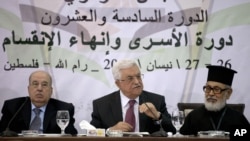JERUSALEM —
Palestinian President Mahmoud Abbas has described the Holocaust as "the most heinous crime ... against humanity in the modern era."
Abbas issued the written statement on the eve of Holocaust Remembrance Day, an annual Israeli observance in memory of the 6 million Jews killed by the Nazis during World War II.
It was an unusual comment for an Arab leader and appeared to be an about-face for Abbas. Israeli officials have accused him of playing down the scope of the Holocaust in a doctoral dissertation in the 1970s.
Abbas, who heads the Palestinian Authority in the West Bank, appeared to be reaching out to the Israeli public following the collapse of nine months of peace talks last week. Israel suspended the negotiations after the Palestinian leader agreed to form a unity government with the Islamic group Hamas, which controls the Gaza Strip.
"Designed to placate"
Hamas refuses to renounce violence or recognize Israel, and Israeli Prime Minister Benjamin Netanyahu said he would never negotiate with a terrorist group that denies his country’s right to exist.
At the weekly Cabinet meeting in Jerusalem, Netanyahu also dismissed Abbas' comments on the Holocaust, saying they were “designed to placate global public opinion.”
He accused Abbas of joining forces with Hamas, describing it as a group that both denies the Holocaust and wants to bring about "a second Holocaust" by destroying the State of Israel.
Palestinian chief negotiator Saeb Erekat believes a unity government would actually benefit the peace process, so he says Israel’s position does not make sense.
“I do not know how Israel is thinking anymore,” Erekat said.
Erekat told Israel’s Army Radio that Abbas has been crystal clear: Hamas will have to accept his policies on peace.
“He said, ‘I will form a government with my program recognizing Israel, accepting the two-state solution, accepting agreements signed, and not accepting violence.’ So what does Israel want?” Erekat asked.
For Netanyahu, the answer is fairly simple.
Referring to Abbas by a traditional form of address in Arabic culture, Netanyahu said, “Abu Mazen must choose between his alliance with Hamas...and making a true peace with Israel.”
Abbas issued the written statement on the eve of Holocaust Remembrance Day, an annual Israeli observance in memory of the 6 million Jews killed by the Nazis during World War II.
It was an unusual comment for an Arab leader and appeared to be an about-face for Abbas. Israeli officials have accused him of playing down the scope of the Holocaust in a doctoral dissertation in the 1970s.
Abbas, who heads the Palestinian Authority in the West Bank, appeared to be reaching out to the Israeli public following the collapse of nine months of peace talks last week. Israel suspended the negotiations after the Palestinian leader agreed to form a unity government with the Islamic group Hamas, which controls the Gaza Strip.
"Designed to placate"
Hamas refuses to renounce violence or recognize Israel, and Israeli Prime Minister Benjamin Netanyahu said he would never negotiate with a terrorist group that denies his country’s right to exist.
At the weekly Cabinet meeting in Jerusalem, Netanyahu also dismissed Abbas' comments on the Holocaust, saying they were “designed to placate global public opinion.”
He accused Abbas of joining forces with Hamas, describing it as a group that both denies the Holocaust and wants to bring about "a second Holocaust" by destroying the State of Israel.
Palestinian chief negotiator Saeb Erekat believes a unity government would actually benefit the peace process, so he says Israel’s position does not make sense.
“I do not know how Israel is thinking anymore,” Erekat said.
Erekat told Israel’s Army Radio that Abbas has been crystal clear: Hamas will have to accept his policies on peace.
“He said, ‘I will form a government with my program recognizing Israel, accepting the two-state solution, accepting agreements signed, and not accepting violence.’ So what does Israel want?” Erekat asked.
For Netanyahu, the answer is fairly simple.
Referring to Abbas by a traditional form of address in Arabic culture, Netanyahu said, “Abu Mazen must choose between his alliance with Hamas...and making a true peace with Israel.”




